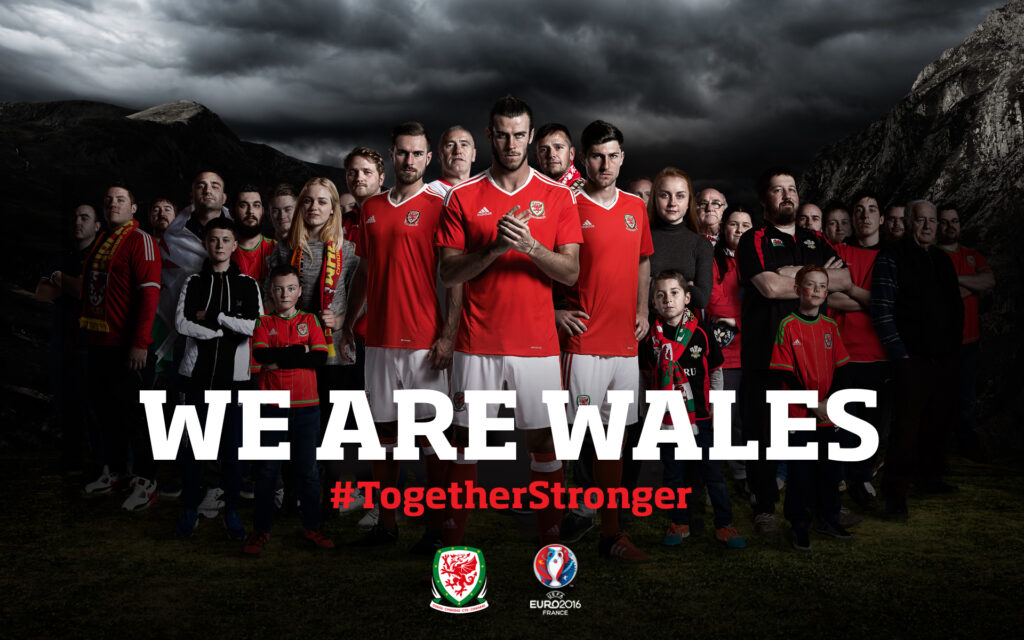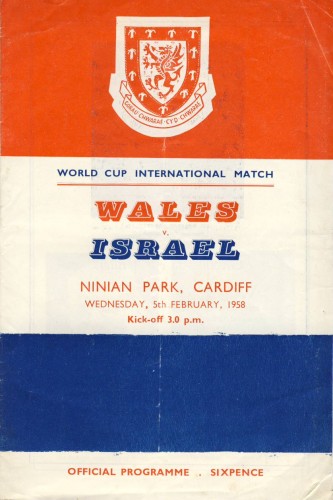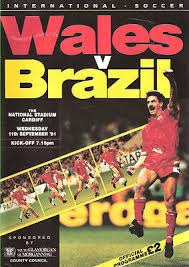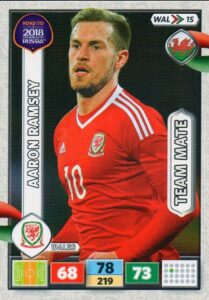History of the Wales national football team

THE Wales national team is the third oldest in world football and has been involved at international level since 1876. Wales played their first official match on March 25, 1876, four years after England and Scotland played the first ever international football match.
They are governed by the Football Association of Wales and compete as a member of the Union of European Football Associations (UEFA), which encompasses the countries of Europe and Israel. As of May 2025, Wales had played 720 international matches since their debut, winning 230, drawing 165 and losing 325.
They have played over 100 fixtures against England and Scotland, regularly competing against both in the British Home Championship between 1884 and 1984, winning the competition on 12 occasions.
In global and continental competitions, Wales had been less successful, having qualified for the FIFA World Cup in 1958, reaching the quarter-finals, and two UEFA European Championships in 2016 and 2020, reaching the semi-finals in the former.
But after 64 barren years without an appearance in the World Cup finals, Robert Page’s Wales defeated Ukraine 1-0 in a play-off final at Cardiff City Stadium on June 5, 2022, to progress to the Qatar tournament. Gareth Bale proved the match-winner, his free-kick being deflected into the net, while goalkeeper Wayne Hennessey earned the man of the match award following an outstanding performance. Wales disappointingly failed to progress from the group stage in Qatar, drawing one and losing two of their three games.
Defender Chris Gunter is Wales’s most capped player of all-time. Having made his debut in 2007, he has accumulated 109 caps as of December 2022. Players who reach 50 appearances for Wales are awarded a golden cap.
Gareth Bale holds the record for the most goals scored for Wales having netted 41 goals as of December 2022, overtaking Ian Rush’s goal-scoring record of 28 in March 2018.
Billy Meredith was the first Welsh player to reach 25 caps and went on to accumulate 48 caps in his career and score 11 goals, both Welsh records at the time. His appearance record stood for 42 years until it was beaten by Ivor Allchurch in 1962, who finished his career with 68 caps. Defender Joey Jones set a new record in the 1980s, amassing 72 caps, before his record was overtaken by Peter Nicholas in 1991 by a single cap.
On May 23, 1994, Neville Southall played in a 2–1 victory over Estonia to earn his 74th cap and overtake Nicholas, eventually gaining 92 caps before retiring. Gunter equalled Southall’s record on November 16, 2018, during a match against Denmark, surpassing the record four days later against Albania.
Wales did not win their first Home International Championship until the 1906–07 tournament and this remained the nation’s only triumph before the First World War. Wales improved considerably in the post-war period, and claimed three titles during the 1920s, although the team was often hindered by the reluctance of Football League clubs to release their players for international duty. The situation was so grave that, in the early 1930s, Wales were forced to select a team of lower league and amateur players which became known as ‘Keenor and the 10 unknowns’, a reference to captain Fred Keenor and the relative obscurity of his team-mates.
By the late 1930s, Wales were again able to call upon their strongest side, and enjoyed their most successful period in the British Home Championship, winning four titles in the six years before the Second World War. When competitive football resumed after the war, Wales began facing opponents from farther afield and played matches against other European nations for the first time. The side also began competing in qualification groups for the FIFA World Cup, but failed to qualify for the 1950 and 1954 tournaments.
The 1955–56 British Home Championship brought some improvement for Wales as the side recorded their first victory over England in 17 years. The period also saw the emergence of John Charles as a regular for the national side. Charles and his brother Mel often played alongside another set of brothers, Ivor and Len Allchurch, becoming the first sets of brothers to play for Wales.
John Charles quickly gained a reputation as the side’s leading player, featuring as either a centre-half or centre-forward, and his performance in the victory over England led Western Mail reporter Dewi Lewis to describe him as “the perfect footballer, if ever there was one”. All four sides shared the British Home Championship title after finishing on three points, the only occurrence of a four-way tie in the competition’s 100-year history. Wales narrowly missed out on winning the title having drawn 1–1 with Northern Ireland in their final game in which Roy Paul missed a penalty with Wales already leading 1–0. Ireland later equalised and the game ended as a draw.

Under manager Jimmy Murphy, Wales qualified for their first World Cup in the 1958 tournament. Wales needed to beat Israel to qualify and travelled to Tel Aviv for the first leg, winning 2–0 after goals from Ivor Allchurch and Dave Bowen. The result was the first time Wales had won an international fixture outside Britain. Allchurch scored again in the second leg and a further goal from Cliff Jones secured Wales’s first qualification to a major international tournament.
In the group stage of the tournament, Wales were drawn alongside Mexico, Hungary and hosts Sweden. Wales secured a 1-1 draw against Hungary thanks to a John Charles header and were then held by Mexico who scored a late equaliser to cancel out Ivor Allchurch’s first-half goal. In their final group match, Sweden had already qualified for the quarter-finals when they met Wales, but the hosts were unable to breach the Welsh defense and the match ended goalless.
Wales finished the group stage with three points, tied for second with Hungary, necessitating a play-off match between the two sides to determine which would advance. Wales faced Hungary needing a victory; Hungary’s superior goal difference meant a draw would see them advance. Hungary took the lead after 30 minutes while John Charles was the focus of the Hungarian defence, leaving the field on more than one occasion to receive treatment. Charles though, proved pivotal as he set up Ivor Allchurch for Wales’s equalising goal and Terry Medwin scored a second to Wales through to the quarter-finals.
Wales met Brazil in the quarter-finals. Much of the build-up focused on Charles’ attempts to recover from injuries sustained against Hungary. Described by one reporter as having received “the most tremendous battering I have ever seen administered to a soccer player”, Charles was unable to take his place in the side. His absence proved costly as several chances were spurned, with Brian Glanville, of The Times, remarking “Wales could have won because all sorts of very tempting centres were coming across the goal and John wasn’t there to head them in.” Brazil went on to win the match by a single goal, scored by a then 17-year-old Pelé.
The Wales side suffered a decline in the 1960s as the 1958 World Cup generation gradually retired. Bowen replaced Murphy and managed the team for a decade on a part-time basis but enjoyed little success, failing to qualify for a World Cup or the early editions of the European Nations’ Cup (later known as the European Championships). He did help the team to share the British Home Championship during the 1969–70 season, the last time Wales won the tournament before the competition was discontinued. In total, Wales won the championship 12 times, sharing five titles.
Bowen left in 1974, having turned down the chance to manage full-time. He was replaced by Englishman Mike Smith who led the team to the quarter-finals of the 1976 European Championships in their centenary year.
Normally the quarter-finals were played at the tournament finals, but the 1976 competition last-eight matches were played as two-legged home and away ties, with the winners advancing to the semi-finals to be held in Yugoslavia. Wales were drawn against the host nation for the quarter-final tie with the first leg being played in Zagreb. The Yugoslavians took the lead after only 45 seconds through Momčilo Vukotić before adding a second early in the second half to win 2–0.
The second leg was billed as one of the biggest matches in Wales’s history, and the FAW (which had grown increasingly short of funds) considered an offer to move the game to Wembley Stadium to maximise profit. The FAW board was split after a vote, leaving the decision in the hands of president Terry Squire who ultimately chose Ninian Park as the venue for what turned out to be a highly-charged affair.
East German referee Rudi Glöckner was appointed for the match, and was said to be infuriated when the flag of his home nation was not raised before the game. He controversially awarded Yugoslavia a penalty in the first half and disallowed a goal for Wales in the second, as the increasingly irate crowd made several attempts to enter the pitch. Missiles were aimed at Glöckner for the remainder of the match, which ended in a 1–1 draw and eliminated Wales from the competition. Violence flared again at the final whistle; Glöckner required a police escort from the pitch, Yugoslavia midfielder Jurica Jerković had a physical altercation with a Welsh fan who had run onto the pitch, and another Welsh fan was arrested after a corner flag, which had been thrown in anger at the referee, struck a policeman in the neck. As a result of the scenes during the match, Wales were initially handed a two-year ban from international football, although this was reduced on appeal to a fine of 20,000 Swiss francs and a requirement that home qualifying matches for UEFA Euro 1980 be held at least 200 kilometres from Cardiff.
The 1976–77 British Home Championship saw Wales record their only victory at Wembley Stadium as Leighton James converted a penalty he had won after being fouled by Peter Shilton to defeat England 1–0.
When the qualifying campaign for the 1978 World Cup resumed, Wales were forced to seek an alternative venue when both Ninian Park and the Racecourse Ground had their safety certificates revoked, resulting in capacity at the venues being greatly reduced. The match was eventually held at Anfield in Liverpool, becoming the first Welsh home fixture to be played outside the country since 1890.
Despite attempts to ensure Welsh fans received priority for the home fixture against Scotland, Scottish fans were able to obtain the majority of the tickets. There was further controversy on the pitch as Scotland were awarded a penalty for handball, despite the arm that had connected with the ball belonging to Scotland forward Joe Jordan. Scotland converted the penalty and added a second as Wales pushed for an equaliser to win the game. A 1–0 defeat to Czechoslovakia in their final qualifying game left Wales bottom of the group.
The FAW appointed former captain Mike England to succeed Mike Smith as national manager. He took charge of his first match in May 1980 against England and met his players for the first time only three days before the match. England had beaten reigning World Cup holders Argentina four days prior, but Wales recorded an upset by winning 4–1 at the Racecourse. The victory was their first home win over England for 25 years and remains their biggest win over their opponents.
England’s first qualifying campaign in his new role was for the 1982 FIFA World Cup and consecutive 4–0 victories over Iceland and Turkey gave cause for great optimism, which was further raised when they defeated both Czechoslovakia and Turkey 1–0. However, the second-half of the campaign fell away badly and Wales failed to qualify having finished tied on points with the Czechs, but ultimately losing out on goal difference.
Wales secured a lucrative friendly against Brazil at Ninian Park in June 1983, paying £50,000 for the side to travel. Despite their opponents lofty reputation the match ended in a 1–1 draw, with Wales having initially led through Brian Flynn’s goal, and generated more than £200,000 for the FAW.
This proved timely as Wales were dealt a blow by the decision to end the British Home Championship in its 100th year as the competition was one of the FAW’s biggest revenue streams. The final competition began with a 2–1 defeat to Scotland but Wales went on to record a victory over England, with Mark Hughes scoring the only goal on his debut, and drew with eventual winners Northern Ireland.
Wales made a poor start to their qualifying campaign for the 1986 FIFA World Cup, but a 1–0 victory over Scotland in Glasgow kept hopes of progress alive, prompting FAW secretary Alun Evans to claimed that the match essentially saved the organisation from bankruptcy by ensuring large crowds for their remaining group matches. This was followed by a 3–0 victory over Spain and Wales played Scotland again, needing to win to guarantee at least a second-place finish.
More than 39,000 fans were at Ninian Park, and Wales took the lead in the opening 15 minutes through Hughes. In the second half, Scotland equalised through a controversial penalty and held on to secure the point needed to finish second and reach the qualifying play-offs. However, the match was overshadowed by the death of Scottish manager Jock Stein who suffered a heart attack in the dugout in the aftermath of his side’s penalty. Spain’s victory over Iceland, combined with the draw to Scotland, meant Wales had failed to qualify once more.
Results left Wales needing to beat Czechoslovakia to qualify for the 1988 European Championship. The FAW were incensed ahead of the game when the FA postponed matches featuring English players, but refused to do the same for Welsh players. As a result, Wales initially travelled to Prague with only ten fit players and the Czechs went on to win 2–0. The defeat to Czechoslovakia ultimately cost England his position and he left Wales after eight years.
The FAW immediately identified Nottingham Forest manager Brian Clough as their first choice replacement, and he was favourable to taking the position but relented when Forest refused to allow him to work simultaneously with both Wales and Forest. Terry Yorath was appointed on a short-term contract and a 1–0 win over Italy in Milan eventually saw him take over the hot-seat alongside his position at Swansea City.
He would later be appointed on a full-time basis, giving up his club commitments, following a stunning victory over Germany at a sold-out National Stadium during the 1992 European Championship qualifying campaign. Ian Rush scored the winning goal.

Ahead of their second game against Germany, Wales met Brazil at the National Stadium for a friendly in which Southall won his 53rd cap to become Wales’s most capped goalkeeper. Wales caused a further surprise by beating the Brazilians following a goal from Dean Saunders. However, Wales’s optimism for the second tie was misplaced as they fell to a 4–1 defeat in Nuremberg, and Germany secured qualification by winning both of their final two matches.
Wales were considered contenders to qualify for the 1994 FIFA World Cup, but it was agony for the long-suffering Welsh fans once again. When Wales defeated Belgium, Rush becoming the leading goal-scorer with his 24th international goal, while Ryan Giggs scored his first.
Yorath led his team to four further qualifying matches without defeat and Wales faced a deciding game against Romania in their final match with a win almost guaranteeing qualification. Romania took the lead early on when Gheorghe Hagi’s shot slipped past Neville Southall but Dean Saunders equalised after an hour. The momentum of the game shifted towards Wales, and, two minutes later, Gary Speed was fouled in the area and Wales were awarded a penalty. Paul Bodin took the spot-kick, but his effort struck the crossbar.
With Wales pushing forward for the winning goal, Romania added a second and won the match 2–1, ending Wales’ hopes of qualifying. The match was further marred by the death of a supporter when a marine flare was fired inside the National Stadium, striking the fan in the neck.
The Welsh side were left devastated by the defeat, Yorath sat in a stairwell at the National Stadium and wept. Bodin, the penalty taker, never played for Wales again. Despite failing to qualify, Wales achieved the highest FIFA World ranking in their history at the time, reaching 27th place.
A period of upheaval followed. Yorath was ultimately informed that he would not be offered a new deal and the FAW appointed John Toshack as the new manager, again alongside his club role with Spanish side Real Sociedad. His appointment proved relatively unpopular among both players and fans, and in his first match Wales suffered a 3–1 defeat to Norway at Ninian Park. The defeat was largely attributed to the new playing style brought in by Toshack and, 48 days into his tenure, he stepped down from the role after a single match.
The FAW re-appointed former manager Mike Smith but he, too, came under pressure during an indifferent 1996 European Championship qualifying campaign and his contract was terminated after a 1–0 loss to Georgia. His replacement was Bobby Gould, who came under fire after a falling-out with striker Mark Hughes. Further embarrassment was added when Wales suffered a 2–1 defeat against Fourth Division club side Leyton Orient in May 1996 despite fielding a full strength side.
Qualifying, however, began more positively as Wales defeated San Marino 5–0 and 6–0 in their opening fixtures, with Hughes returning to score four goals across the games. However, back-to-back fixtures against group favourites the Netherlands proved much more difficult; after losing 3–1 in Cardiff, Wales suffered their heaviest defeat in a competitive fixture in the return match, losing 7–1.
Gould finally resigned following a 4–0 defeat to Italy in 1999, and the FAW turned to two legends of the national team, Neville Southall and Mark Hughes, to take temporary charge of the match against Denmark four days later, with Hughes later being appointed on a permanent basis.
Under Hughes, Wales came close to qualifying for a place at Euro 2004 in Portugal, being narrowly defeated by Russia in the play-offs.
Following a disappointing start to 2006 FIFA World Cup qualification, Hughes left his role with the national team to take over as manager of English Premier League outfit Blackburn Rovers. On November 12, 2004, John Toshack was appointed manager for the second time.
In Euro 2008 qualifying, Wales could only finish fifth in their group, although improved performances towards the end of the competition by a team containing five players who were eligible for selection for the under-21 squad was viewed as a hopeful sign of future progress for the team.
Nevertheless, Wales failed to qualify for the 2010 World Cup and 2012 European Championships and Toshack stood down as manager. Brian Flynn stepped in as caretaker manager before Gary Speed took over as permanent manager on December 14, 2010. Wales would hit rock bottom after defeats to the Republic of Ireland and England saw them dip to their lowest FIFA world ranking of 117th.

Speed appointed 20-year-old Aaron Ramsey captain, making him the youngest Wales captain. and results gradually improved during 2011 to see Wales back up to a respectable 45th in the FIFA rankings. A 4–1 home win in a friendly match against Norway in November proved to be Speed’s last match in charge of Wales. His tenure as manager ended in tragic circumstances when he was found dead at his home on 27 November, having apparently committed suicide.
Chris Coleman was appointed Wales team manager on January 19, 2012, but he got off to a bumpy start as the side was thrashed 6-1 by Serbia in a failed bid to qualify for the 2014 World Cup finals. Ashley Williams replaced Ramsey as captain and Wales were placed in a group alongside Andorra, Belgium, Bosnia and Herzegovina, Cyprus and Israel for Euro 2016 qualifying. By July 2015, following four wins and two draws, Wales topped the group and had attained their then highest FIFA ranking of 10th,.
Wales were thus elevated to the top seeds for the 2018 FIFA World Cup qualification draw which grouped them with Austria, Serbia, the Republic of Ireland, Moldova and Georgia.
Watch Independent Football Nation
In September 2015, England dropped to 10th in the FIFA rankings, making Wales – in ninth position – the highest ranked British team for the first time in its history. A month later, Wales attained their highest-ever FIFA ranking of eighth. On 10 October 2015, Wales lost 2–0 to Bosnia and Herzegovina. However, Wales’s qualification for Euro 2016 in France was confirmed after Cyprus defeated Israel that same evening.
Playing in their first European Championship tournament, Wales were drawn into Group B with Slovakia, Russia and England. On their Euro debut, on June 11 against Slovakia at the Nouveau Stade de Bordeaux, Gareth Bale scored direct from a free-kick to give Wales a 1–0 lead, and Hal Robson-Kanu scored the winner in a 2–1 victory that put them top of the group. In their second match, against England in Lens, Wales led 1–0 at half-time through another Bale free-kick, but lost 2–1. Against Russia at the Stadium Municipal in Toulouse, Aaron Ramsey, Neil Taylor and Bale scored in a 3–0 win that saw them win the group.
In their round of 16 match at the Parc des Princes in Paris, Wales played Northern Ireland and won 1–0 after Bale’s cross was put in as an own goal. In the quarter-final against Belgium, Wales went behind to a long-range effort from Radja Nainggolan, but captain Ashley Williams headed an equaliser before Robson-Kanu and Sam Vokes confirmed a storming 3–1 victory for Wales. This victory advanced Wales to their first major tournament semi-final and also made them the first British nation to advance to the semi-finals of a major tournament since England did so at Euro 1996 as hosts.
The first half of the much-anticipated semi-final against Portugal in Lyon went goalless, but goals from Cristiano Ronaldo and Nani early in the second half saw Portugal break Welsh hearts with a 2–0 win. Wales were welcomed back home on July 8 with an open-top bus parade around Cardiff, starting at Cardiff Castle and going past the Millennium Stadium before finishing at the Cardiff City Stadium.
In September 2016, Wales opened their 2018 World Cup qualification campaign with a comfortable 4–0 home win against Moldova. However, they followed this with a run of five consecutive draws away to Austria, at home to Georgia, both home and away against Serbia and away to the Republic of Ireland. Despite wins over Austria, Moldova and Georgia, Wales had left themselves with too much to do and a 1-0 loss to the Republic of Ireland on October 9 meant they failed to qualify for the finals in Russia. Chris Coleman resigned as Wales team manager on November 17, 2017.
After nearly two months of managerial vacancy, Ryan Giggs was named Wales’s new manager. Giggs, who signed a four-year contract, led Wales for the 2018–19 UEFA Nations League campaign and Euro 2020 qualification. Despite losing two of the first three qualifiers for UEFA Euro 2020, Wales went unbeaten in the second half of 2019 and ultimately qualified in second place following a 2–0 win over Hungary in their final match on November 19.
Euro 2020 was delayed until 2021 by the COVID-19 pandemic in Europe, which meant Wales’s next games came in the 2020–21 UEFA Nations League. They kept five consecutive clean sheets on the way to an unbeaten record in the competition, winning five games and drawing one, despite Giggs not being available for the last two games due to legal troubles. With Robert Page in interim charge, the team beat Finland 3–1 in their final match to finish top of the group and gain promotion to League A for the 2022–23 UEFA Nations League.
UEFA Euro 2020 was played in June/July 2021 with matches spread across 11 host countries throughout Europe for the first time, rather than hosted by a single country. Consequently, the Wales Group A matches against Switzerland and Turkey were held in Baku, Azerbaijan and then against Italy in Rome. Under Page as interim manager, Wales progressed from the group stage after finishing second in the group to Italy, the eventual tournament winners. In the last 16 round Wales lost to Denmark in Amsterdam.
For 2022 World Cup qualification Wales were drawn in Group E with Belgium, Czech Republic, Belarus and Estonia with Page again acting as interim manager for the matches in 2021. Wales finished second in Group E and progressed to the qualification play-off stage. After beating Austria in the play-off semi-final, Wales qualified for the World Cup for the first time since 1958 with a 1–0 win over Ukraine at the Cardiff City Stadium on June 5, 2022.
Learning Cymraeg Through Football
In June 2022, Giggs resigned as Wales manager and Page stayed on as interim manager before being given a four-year contract extension in September 2022, managing Wales at the 2022 World Cup.
At the finals in Qatar, Wales drew their opening match against the United States after Gareth Bale equalised with a late penalty kick. Their second match against Iran saw goalkeeper Wayne Hennessey sent off for a reckless challenge on Iran’s Mehdi Taremi; Iran then scored twice in injury time to inflict a 2-0 defeat on Wales. In their last-ditch effort in hopes of making it to the Round of 16, they faced off against neighbouring nation England. However, two goals from Marcus Rashford and one from Phil Foden resulted in a 3–0 defeat for Wales and an early exit for Robert Page’s side.
Following their promotion in the previous Nations League campaign, Wales were drawn in Group A4 of the 2022–23 UEFA Nations League along with Belgium, the Netherlands and Poland.
January 2023 saw the retirement from club and international football of Wales captain Bale. At the time of his retirement he was the record goal scorer and record appearance holder for the Welsh team.
Wales began to compete for a place in the UEFA Euro 2024, and were drawn in Group D against Armenia, Turkey, Latvia and Croatia. Wales opened their qualification run with a 1–1 away draw to Croatia, who finished third in the World Cup in Qatar, before gaining a hard-fought 1–0 win over Latvia at home.
However, Wales suffered two setbacks, losing 4–2 at home to Armenia before crumbling 2–0 away to Turkey, each game seeing a Welsh player sent off. Wales regained hope with a 2–0 away win over Latvia and, most notably, a heroic 2–1 victory over Croatia at home soil to put Wales back in the race. But they squandered this golden opportunity in one of two penultimate matches, held 1–1 away to Armenia and by the same scoreline at home to Turkey.
All was not lost, however, as a strong Nations League record allowed them to enter a play-off against Finland, the winners playing host to either Poland or Estonia in a play-off final.
Captained by Ben Davies, Wales comfortably saw off the Finns 4-1 in front of a sell-out crowd in Cardiff to set up a winner-takes-all meeting with Poland five days later.
Sadly, despite passionate support, Wales were held to a goalless draw by the experienced Poles and eventually succumbed after extra time, losing 5-4 in a penalty shoot-out.
Craig Bellamy was announced as the head coach of the Welsh national team in July 2024, starting his tenure with a successful run in the Nations League, which saw Wales win three and draw three of their six games to finish top of their group and qualify for a return to the top tier.
The Bellamy feel-good factor continued with an unbeaten start to Wales’s 2026 FIFA World Cup qualification campaign with a 3-1 win over Kazakhstan and a draw away to North Macedonia. Next came a 3-0 home win over Liechtenstein, before the unbeaten run came to an end in a thrilling away encounter with old rivals Belgium. Despite going 3-0 behind, Ben Davies’s team fought back valiantly to level the scores at 3-3, only for Kevin de Bruyne to break Welsh hearts with an 88th-minute winner.
BACK TO HOME PAGE
